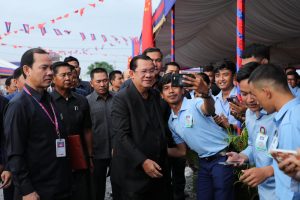Cambodia’s outgoing Prime Minister Hun Sen says that he may one day return to the top post, should the life of his son and heir designate be threatened in any way.
Speaking in what he claimed would be his last public engagement prior to handing over power to his son Hun Manet, Hun Sen said he was worried that the handover of power to Hun Manet, 45, might result in instability, according to Radio Free Asia (RFA).
“I warn you that if my son’s life is endangered, the possibility of returning to be the prime minister is that I have to come back and work,” he said, in RFA’s translation. “I have to return to be the prime minister for a while. After that, I will choose who can be the next prime minister.”
On July 26, the Cambodian leader, who has led Cambodia since 1985, announced that the long-planned handover of power to his son would take place on August 22, following his Cambodian People’s Party (CPP)’s walkover victory at national elections last month.
Hun Sen, who will retain the post of CPP president, added that while he would not seek to influence the new government’s decisions, he would continue to wield influence behind the scenes in order to ensure a stable transition.
“The older generation has not yet left politics,” he said. “I am still the president of the ruling party, accompanied by four vice presidents, along with several other members of the central committee, some in the National Assembly and some in the Senate.”
The comment confirms the widespread expectations that Hun Sen will remain the primary locus of power in Cambodia, even as his son takes on the title and duties of prime minister. In some ways this is only to be expected in a system where power resides in individuals, and the ties of loyalty and obligation that bind them, rather than in political offices or institutions.
But this facet of the Cambodian political system makes any change in leadership inherently risky, and there have long been rumors that powerful CPP officials are unhappy with Hun Sen’s decision to engineer a dynastic succession.
In comments to RFA, for instance, former opposition lawmaker Um Sam An claimed that there were powerful people within the party who were opposed to Hun Sen’s dynastic consolidation, which “may result in armed conflicts that prevent the transfer of power” in the coming weeks.
Hun Sen’s opponents have predicted such intra-party rifts for decades, without them ever eventuating. However, the fact that Hun Sen would publicly raise the prospect to possible threats to the life of the country’s prime minister-designate speaks to the sensitive nature of the transition, and the difficulties he faces – both personal and political – in stepping back from a system in which he has made himself indispensable. It also points to the volatile, fluid nature of the pacts of loyalty and obligation underpinning Hun Sen’s power.
But in yesterday’s speech, Hun Sen emphasized that he was stepping back at this juncture, just prior to his 71st birthday, in order to help maintain stability while he still has some gas left in the tank.
“Transferring this position to the next generation now means the process would be far more stable and secure than doing it when I am getting older or dead,” he reportedly said.
Indeed, liberated from the duties to attend international summits and state visits, and to inaugurate pagodas and highways, Hun Sen will be able to dedicate what time and energy he has left to the task of shoring up his son’s power – and securing the preservation of his own legacy.
Hun Sen he will submit Manet’s name to King Norodom Sihamoni for approval as prime minister on August 7. The first session of the National Assembly is set for August 21 with the new government under Manet will be appointed the following day.

































